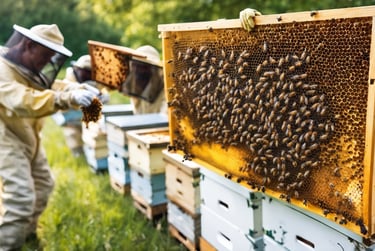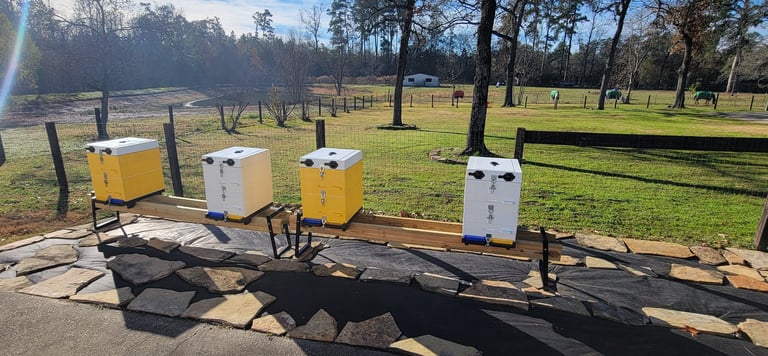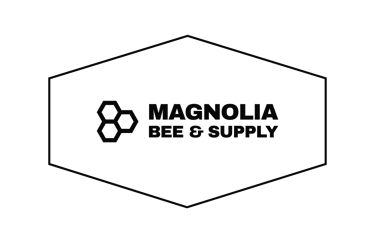Unlock the Secrets of Beekeeping Success with Magnolia Bee & Supply!
Welcome to the fascinating world of beekeeping! Whether you're a seasoned beekeeper or just starting out, having the right beekeeping supplies is essential for success. And that's where Magnolia Bee & Supply comes in.
At Magnolia Bee & Supply, we understand the importance of quality equipment in beekeeping. With our wide range of beekeeping supplies, you can ensure the health and productivity of your hive. From protective gear like bee suits and gloves to essential tools like smokers and hive tools, we have everything you need to maintain your beehive.
What sets us apart from the rest is our commitment to providing top-notch products and exceptional customer service. Our team of knowledgeable beekeeping enthusiasts is always ready to assist you in choosing the right supplies for your specific needs. We strive to empower beekeepers of all levels with the tools and knowledge necessary to succeed.
Unlock the secrets of beekeeping success with Magnolia Bee & Supply. Shop with us today and experience the difference that quality beekeeping supplies can make in your journey as a beekeeper.
Why Beekeeping is Important
Beekeeping is a vital practice that plays a crucial role in the ecosystem and food production. Bees are not only responsible for pollinating a significant portion of the world's crops but also contribute to the biodiversity of plants and flowers. By becoming a beekeeper, you actively participate in the preservation of these essential pollinators and help ensure the sustainability of our environment.
Beekeeping also offers numerous benefits to individuals and communities. It can be a rewarding hobby that allows you to connect with nature, learn about the intricate workings of a beehive, and produce your own honey. Additionally, beekeeping can provide an additional source of income through the sale of honey, beeswax, and other bee-related products.
The Basic Equipment Needed for Beekeeping
Before delving into the fascinating world of beekeeping, it is essential to gather the necessary equipment to ensure a successful and enjoyable experience. Here are some of the basic supplies you will need:
1. Beehive: The beehive serves as the home for your bees. It consists of several components, including hive boxes, frames, and foundation sheets. These components provide the structure and support necessary for the bees to build their combs and store honey.
2. Protective Gear: Beekeeping can be a stinging affair, quite literally. To protect yourself from bee stings, it is crucial to invest in protective gear such as a bee suit, veil, gloves, and boots. These items create a barrier between you and the bees, reducing the risk of stings.
3. Smoker: A smoker is an indispensable tool in beekeeping. It emits smoke, which has a calming effect on the bees, making them less likely to sting. Smokers are used during hive inspections and manipulations to keep the bees calm and manageable.
4. Hive Tool: A hive tool is a versatile implement that aids in the manipulation of beehive components. It is used to pry open hive boxes, separate frames, scrape off excess wax and propolis, and perform various other tasks during hive maintenance.
Remember, these are just the basic supplies needed to get started. As you delve deeper into beekeeping, you may find the need for additional equipment based on your specific circumstances and goals.
Choosing the Right Location for Your Beehives
Selecting the right location for your beehives is crucial to the success of your beekeeping venture. Here are some factors to consider when choosing a location:
Sunlight: Bees thrive in sunny locations. Aim for a spot that receives at least six hours of direct sunlight each day. This helps keep the hive warm and encourages proper brood development.
Access to Water: Bees need a nearby water source for hydration and cooling the hive. Ensure there is a water source within a reasonable distance, such as a pond, stream, or birdbath.
Forage Availability: Bees require a diverse range of flowering plants to gather nectar and pollen. Look for areas with abundant floral resources, such as gardens, meadows, or nearby farmland.
Protection from Wind: Strong winds can disrupt the flight patterns of bees and make foraging challenging. Consider placing your beehives in a location sheltered from strong winds, such as behind a windbreak or near a natural barrier.
Accessibility: Ensure that the location you choose is easily accessible for hive inspections, maintenance, and honey extraction. This will save you time and effort in the long run.
By considering these factors, you can create an ideal environment for your bees, increasing their chances of thriving and maximizing honey production.
How to Start a Beehive
Starting a beehive involves several steps, from assembling the hive components to introducing bees into the hive. Here is a general overview of the process:
1. Assemble the Hive: Follow the manufacturer's instructions to assemble the hive components, including the bottom board, hive boxes, frames, and cover. Ensure that everything fits snugly together to prevent any gaps.
2. Install Foundation Sheets: Insert foundation sheets into the frames. These sheets provide a guide for the bees to build their comb.
3. Introduce Bees: Acquire a package of bees or a nucleus colony from a reputable source. Carefully follow the instructions provided by the supplier to introduce the bees into the hive. Take precautions to protect yourself and the bees during this process.
4. Provide Food and Water: Initially, bees will rely on stored food from their previous location. However, it is beneficial to provide them with a sugar syrup solution to supplement their food supply. Additionally, ensure there is a nearby water source for the bees to access.
5. Monitor and Maintain: Regularly inspect the hive to ensure the health and productivity of the bees. Look for signs of disease, pests, or overcrowding. Make any necessary adjustments to the hive and address any issues promptly.
Starting a beehive requires patience, knowledge, and attention to detail. As you gain experience, you will become more adept at managing your hive and ensuring its success.
Beekeeping Techniques and Best Practices
Beekeeping is both an art and a science. To become a successful beekeeper, it is essential to learn and implement various techniques and best practices. Here are some key aspects to consider:
1. Hive Inspections: Regular hive inspections are crucial for monitoring the health and productivity of your bees. During inspections, you can assess the condition of the hive, check for signs of disease or pests, and ensure that the bees have enough space and resources.
2. Queen Management: The queen bee is the heart of the hive. Proper queen management involves ensuring a healthy and productive queen, managing swarming behavior, and replacing queens when necessary.
3. Harvesting Honey: Honey harvesting is one of the most rewarding aspects of beekeeping. It is essential to follow proper techniques to ensure a successful and hygienic harvest. This includes using appropriate equipment, extracting honey without contamination, and leaving enough honey for the bees' winter stores.
4. Pest and Disease Management: Beehives are susceptible to various pests and diseases, such as varroa mites, wax moths, and foulbrood. Implementing effective pest and disease management strategies, such as regular monitoring, treatment, and good hygiene practices, is crucial for maintaining healthy colonies.
5. Seasonal Management: Beekeeping practices vary throughout the year, depending on the season and the specific needs of the bees. Understanding the seasonal patterns and requirements of your bees will help you make informed decisions and provide appropriate care.
By adopting these techniques and best practices, you can optimize the health and productivity of your beehive, ensuring a successful beekeeping journey.
Common Challenges in Beekeeping and How to Overcome Them
Beekeeping, like any agricultural practice, comes with its fair share of challenges. However, with proper knowledge and preparation, these challenges can be overcome. Here are some common challenges in beekeeping and strategies to address them:
1. Varroa Mites: Varroa mites are parasitic pests that can weaken and kill honeybee colonies. Regular monitoring and treatment for varroa mites are essential to prevent infestations. Follow recommended treatment methods and implement integrated pest management strategies to control mite populations.
2. Hive Diseases: Bees can be susceptible to various diseases, such as American foulbrood, European foulbrood, and chalkbrood. Educate yourself about common hive diseases, their symptoms, and appropriate treatment methods. Practice good hygiene in your hive and follow recommended disease prevention measures.
3. Swarming: Swarming is a natural reproductive process of honeybees. While swarming is a sign of a healthy hive, it can lead to the loss of a significant portion of your colony. Implement swarm prevention techniques, such as providing sufficient space and managing queen production, to reduce the likelihood of swarming.
4. Environmental Factors: Extreme weather conditions, pesticide exposure, and habitat loss can impact the health and productivity of bees. Minimize pesticide use near your beehives, provide a diverse range of forage resources, and take measures to protect your bees from adverse weather conditions.
5. Lack of Knowledge: Beekeeping is a continuous learning process. Stay informed about the latest research and best practices in beekeeping. Join local beekeeping associations, attend workshops and conferences, and engage with experienced beekeepers to expand your knowledge and skills.
By being proactive and prepared, you can overcome these challenges and ensure the success of your beekeeping venture.
The Benefits of Using Magnolia Bee & Supply
Investing in top-notch beekeeping equipment, such as the products offered by Magnolia Bee & Supply, can significantly enhance your beekeeping experience. Here are some benefits of using quality beekeeping supplies:
1. Durability: High-quality beekeeping equipment is built to withstand the demands of beekeeping. Durable supplies will last longer, saving you money in the long run.
2. Safety: Beekeeping can be a hazardous activity if proper safety precautions are not taken. Top-notch beekeeping supplies, such as protective gear, offer superior protection against bee stings and other potential hazards.
3. Efficiency: Quality beekeeping tools and equipment are designed for ease of use and efficiency. They can streamline your beekeeping tasks, making them more manageable and time-saving.
4. Bee Health: Using top-notch beekeeping supplies can contribute to the overall health and well-being of your bees. For example, high-quality hive components provide better insulation and ventilation, creating a more comfortable environment for the bees.
5. Customer Support: When you choose reputable beekeepers supply companies like Magnolia Bee & Supply, you can expect excellent customer support. Knowledgeable staff can provide guidance, answer your questions, and assist you in choosing the right products for your specific needs.
Investing in quality beekeeping supplies is an investment in the success and enjoyment of your beekeeping journey.
Essential Tools and Products for Successful Beekeeping
To ensure the health and productivity of your beehive, it is essential to have the right tools and products at your disposal. Here are some essential items to consider:
1. Bee Suits and Protective Gear: Bee suits, veils, gloves, and boots are essential for protecting yourself from bee stings during hive inspections and manipulations.
2. Smokers: Smokers produce cool smoke that helps calm the bees during hive inspections. They are indispensable tools for beekeepers.
3. Hive Tools: Hive tools are versatile implements that aid in various hive manipulations, such as prying open hive boxes, separating frames, and scraping off excess wax and propolis.
4. Hive Components: High-quality hive components, including hive boxes, frames, foundation sheets, and covers, provide the structure and support necessary for your bees to thrive.
5. Feeding and Medication: Sugar syrup feeders, pollen substitutes, and medication for pest and disease control are essential for maintaining the health and well-being of your bees.
6. Honey Extraction Equipment: When it's time to harvest honey, you'll need equipment such as honey extractors, uncapping knives, and filtering systems to extract and process your honey.
These are just a few examples of the essential tools and products available to beekeepers. The specific items you need may vary depending on your beekeeping goals, preferences, and local conditions.
Where to Find Magnolia Bee & Supply
When it comes to finding top-notch beekeepers equipment, look no further than Magnolia Bee & Supply. We are dedicated to providing beekeepers with the highest quality equipment and supplies. Visit our website or contact our knowledgeable team to explore our wide range of products and find everything you need for your beekeeping journey.
Remember to do your research, read reviews, and choose reputable suppliers to ensure the quality and authenticity of the products you purchase.
Conclusion: Taking Your Beekeeping Journey to the Next Level
Beekeeping is a rewarding and fascinating hobby that allows you to connect with nature, contribute to the environment, and enjoy the fruits of your labor. By equipping yourself with top-notch beekeepers supply and implementing best practices, you can take your beekeeping journey to the next level.
Remember to prioritize the health and well-being of your bees, stay informed about the latest research and techniques, and seek support from experienced beekeepers and reputable suppliers.
Unlock the secrets of beekeeping success by choosing Magnolia Bee & Supply for all your beekeeping equipment and supply needs. Shop with us today and experience the difference that quality beekeeping supplies can make in your journey as a beekeeper.
Together, let's create a thriving and sustainable future for bees and beekeepers alike. Happy beekeeping!




Get in touch
Address
1010 Magnolia Bvld Suite K
Magnolia Tx, 77355
www.magnoliabeeandsupply.com
Magnolia, Texas 77355
Contacts
281-305-4072
info@magnoliabeeandsupply.com
magnoliabeeandsupply@gmail.com
Provide your email address below to stay informed of specials offers, other beekeeping related information
